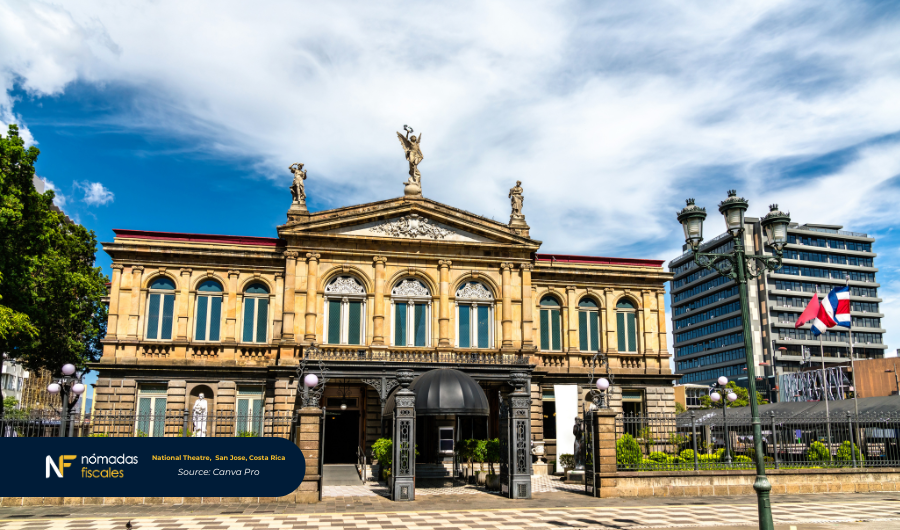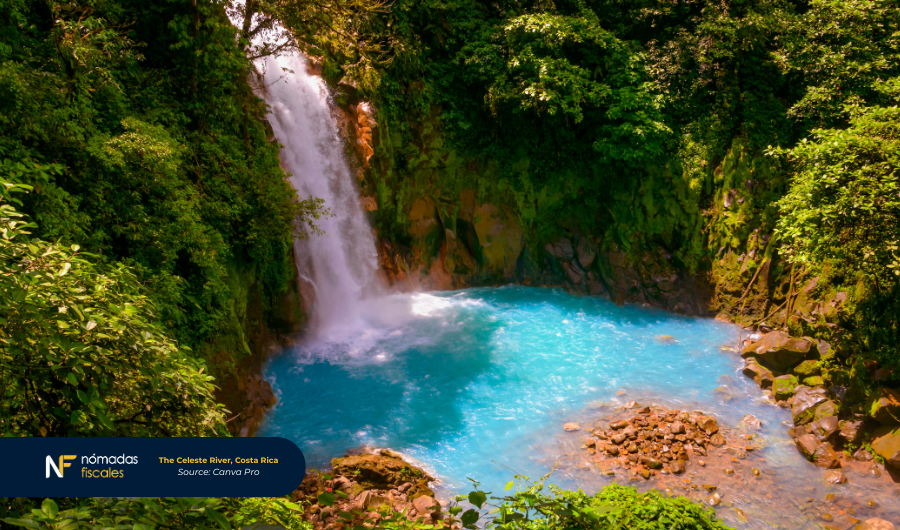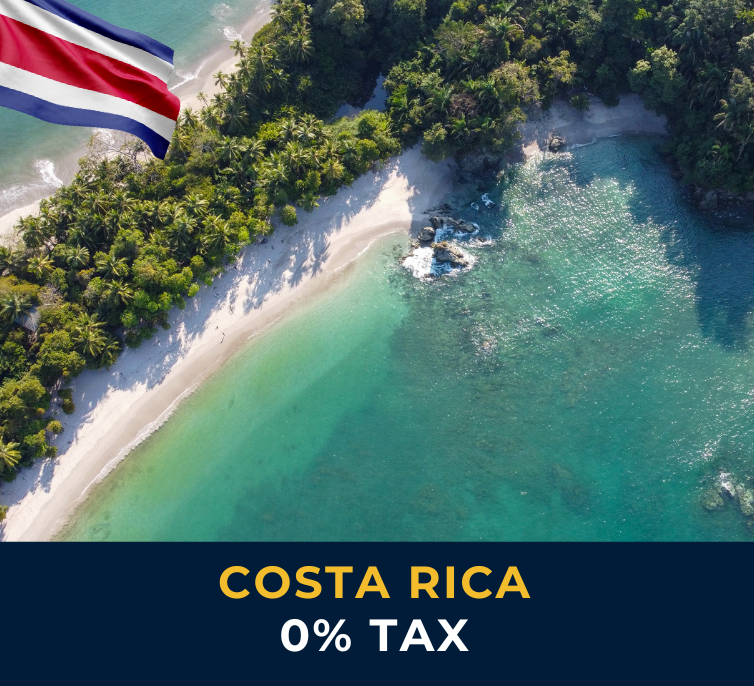Costa Rica is a preferred option for tax nomads seeking a stable residence, offering two fundamental pillars: 0% taxation and a high quality of life.
In Costa Rica, the territorial tax system is key: only income generated within the country is taxed. To live tax-free, it’s sufficient for your clients or sources of income to be located outside of Costa Rica.
Beyond the tax advantages, Costa Rica is known for its high quality of life.
With a population of over 5 million, the country stands out for its lush nature and its focus on the well-being and freedom of its citizens.
Costa Rica’s famous “pura vida“ philosophy reflects an optimistic and joyful lifestyle, promoting happiness and harmony.
Residents enjoy a safe environment, with the lowest crime rates in the region, and benefit from a highly regarded public healthcare system.
Additionally, Costa Rica is a pioneer in civil rights, being the first country in Central America to legalize same-sex relationships.
The country’s political and social stability is remarkable, especially considering that Costa Rica is one of the few countries in Latin America without a military.
Its transportation system is efficient, with four international airports, including the Juan Santamaría International Airport, which offers direct flights to the United States and Europe.
The country, where Spanish is the official language, also has a growing presence of English speakers due to the large number of residents from the United States and Canada.
Although the local currency, the Costa Rican colón, has a high exchange rate against the euro and the dollar, the use of the U.S. dollar is common in many transactions.
In summary, the combination of a favorable territorial tax system with a vibrant living environment makes Costa Rica an exceptional destination for entrepreneurs and investors seeking an ideal place to establish and develop their personal and professional projects.
Taxes in Costa Rica
As we mentioned earlier, the fundamental advantage of Costa Rica is its territorial tax system.
This system means that only income generated within the country is subject to taxation.
However, it is crucial to have good advice to properly structure your business and income sources abroad. Ensuring that your income originates from outside Costa Rica and that your business structure complies with legal requirements is essential to avoid local tax audit risks.
If you receive income within Costa Rica, the country does not have an extremely burdensome tax system compared to other tax destinations:
Personal income tax can reach up to 25%, while capital gains are generally taxed at 15%.
Businesses, on the other hand, face a corporate income tax that can reach up to 30%, with a progressive system similar to personal income tax.
However, these taxes only apply if you conduct commercial activities within the country.
One aspect to consider is that Costa Rica has a limited number of double taxation treaties. Currently, the country has agreements in place with Germany, Mexico, Spain, and the United Arab Emirates.
This limitation could result in surprises with tax withholdings of up to 25% if proper tax planning is not carried out.
Despite this limitation, Costa Rica offers great flexibility in structuring international businesses, as it does not apply Controlled Foreign Corporation (CFC) Rules.
Additionally, the country does not impose taxes on inheritance, donations, wealth, or exit taxes.

Types of Residency in Costa Rica
Costa Rica is an accessible destination for tourists, with numerous countries whose citizens can enter without needing a visa.
However, for tax nomads, it is essential to obtain a residence permit that allows for an extended stay and facilitates meeting the requirements to become a tax resident. In Costa Rica, this involves spending at least 183 days a year in the country to qualify as a tax resident.
In this section, we will explore the different types of residence permits available in Costa Rica, starting with the easiest and most temporary options, and moving towards the more demanding but longer-lasting options.
Digital Nomad Visa in Costa Rica
Introduced in 2022, the Digital Nomad Visa in Costa Rica has quickly gained popularity due to the rise of remote work and the country’s appeal as a destination for digital nomads.
This visa allows remote workers to reside in Costa Rica for one year, with the possibility of renewing for an additional year, while continuing their work activities for employers, clients, or their own business abroad.
To qualify for this visa, applicants must demonstrate a stable income of at least $3,000 per month. This requirement is verified through bank statements from the last 12 months.
Additionally, it is necessary to have health insurance coverage in the country, as well as meet other standard requirements, such as presenting a valid passport.
Temporary Pensioner Residency
The residency for retirees in Costa Rica, also known as Temporary Pensioner Residency, is designed for those who receive stable and lifelong income.
To qualify, it is necessary to demonstrate a lifelong pension of at least $1,000 per month, whether from a social security plan in any country or from a private pension.
Additionally, residents under this visa must spend at least 4 months a year in Costa Rica to maintain their status.
Temporary Rentier Residency
The temporary rentier residency allows an initial stay of two years, with the possibility of extending it up to a maximum of ten years.
To qualify for this visa, one must meet one of the following requirements:
- Stable Monthly Income: Demonstrate a monthly income of at least $2,500. This income must be constant and come from a reliable source.
- Bank Deposit: Alternatively, one can choose to deposit $60,000 into a bank in Costa Rica.
In addition to these financial requirements, it is mandatory to remain in Costa Rica for at least four months a year to maintain residency status.
Costa Rica Golden Visa (Residency by Investment)
The Investment Residency Visa in Costa Rica, also known as the Golden Visa, provides an opportunity to obtain residency in the country through a significant investment in its economy.
To qualify, it is necessary to make an investment of at least $200,000 in one of the following areas:
- Real Estate.
- Businesses.
- Public Debt (Government Bonds).
Permanent Residency in Costa Rica
If you have obtained residency in Costa Rica through investor, pensioner, or rentista permits, you can apply for permanent residency after three years with these permits.
Once you obtain permanent residency, you will enjoy two main benefits:
- Work Permit: You will be able to work in the country without restrictions. Until then, you could only work in your own business or receive income from abroad.
- Residency Flexibility: There will be no minimum time requirement to reside in the country each year to maintain your status. However, you should remember that permanent residency must be renewed regularly. Initially, renewal occurs every two years, and later, every three years.
Costa Rican Passport
Costa Rican nationality is regularly ranked among the best in the world due to its visa-free access to around 150 countries and the possibility of holding dual nationality.
However, obtaining Costa Rican citizenship is not as quick as in some other countries.
After acquiring permanent residency, you generally need to wait 7 years to apply for citizenship.
There is, however, an exception for Spanish and Latin American citizens, who can apply for citizenship after 5 years of permanent residency.
In conclusion, Costa Rican citizenship is not the fastest option for those seeking to obtain a second passport in a short time.
Nevertheless, it is a great incentive for those planning to reside in Costa Rica long-term, offering a high-quality passport with extensive global advantages.

Costa Rica Tax Residency Review
From a tax perspective, there is no doubt that Costa Rica is an excellent option, as it allows for a 0% tax rate through proper planning and structuring of income from abroad.
It ranks among the top countries for those looking to reside long-term and maintain a stable tax residency, being very comparable to the option offered by its neighbor Panama.
However, if your goal is to obtain citizenship quickly, Costa Rica might not be the best choice. In comparison, countries like El Salvador offer faster citizenship.
On the other hand, Paraguay might be preferable if you seek flexibility and speed in obtaining tax residency, along with a similar territorial tax system.
Overall, Costa Rica is an excellent option for many tax nomads, combining attractive taxation with a high quality of life, although the speed of obtaining citizenship and flexibility in residency could be improved compared to other alternatives.
Are you interested in obtaining residency, citizenship, or setting up a company in Costa Rica?
Or would you prefer a complete analysis of your situation to discover the best option for you?
In either case, we can help!
Simply request your FREE INITIAL CONSULTATION BY CLICKING HERE, or contact us directly via WhatsApp or through the form below.
Contact us
Costa Rica applies taxes only to income generated within the country. The main taxes are:
- Personal Income Tax: Up to 25%.
- Capital Gains: Generally 15%.
- Corporate Income Tax: Up to 30%.
With the right structure, you can achieve a 0% tax rate on international income.
The cost of opening a company in Costa Rica ranges from $2,000 to $3,500.
The price range depends on the type of company being established and any additional services required for incorporation.
- Digital Nomad Visa: For remote workers with an income of at least $3,000 per month and health insurance in the country.
- Pensioner Residency: For those receiving a lifelong pension of at least $1,000 per month.
- Rentier Residency: Requires a monthly income of $2,500 or a deposit of $60,000 in a Costa Rican bank.
- Golden Visa: Minimum investment of $200,000 in real estate, businesses, or public debt.
After three years with these permits, you can apply for permanent residency.
After obtaining permanent residency, you generally need to wait 7 years to apply for Costa Rican citizenship. However, Spanish and Latin American citizens can apply after 5 years of permanent residency.
You can apply for permanent residency in Costa Rica after three years with investor, pensioner, or rentier permits.
You must have spent at least four months per year in the country during these years.
The Costa Rican Golden Visa, or Residency by Investment, requires a minimum investment of $200,000 in real estate, a business, or public debt (government bonds).
To obtain the Digital Nomad Visa in Costa Rica, you must demonstrate a stable income of at least $3,000 per month for the past 12 months and have health insurance coverage in the country.
To obtain Temporary Rentista Residency in Costa Rica, you must have a stable monthly income of at least $2,500 or make a deposit of $60,000 in a Costa Rican bank.
It is also necessary to reside in the country for at least four months per year.

